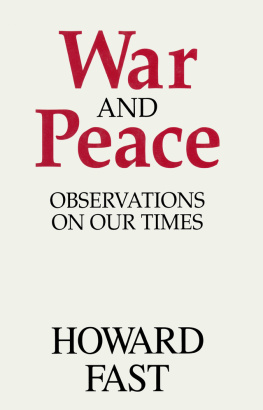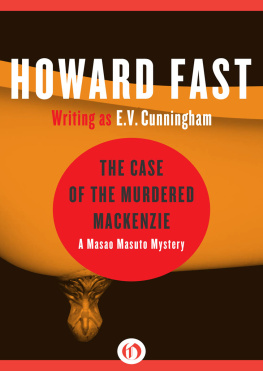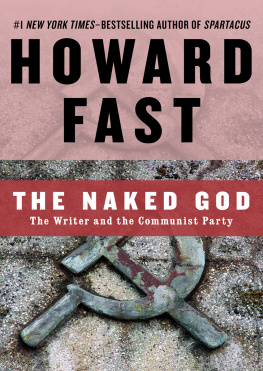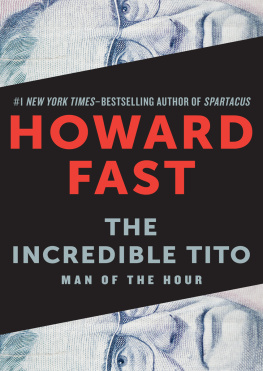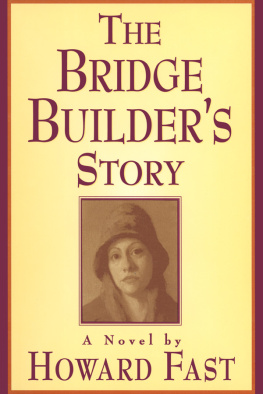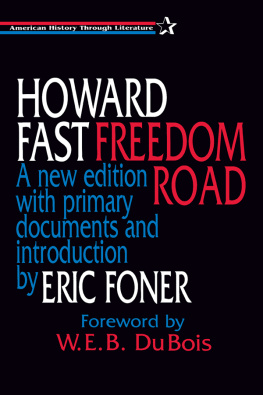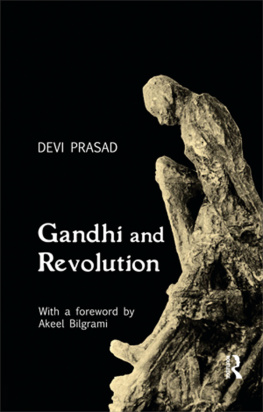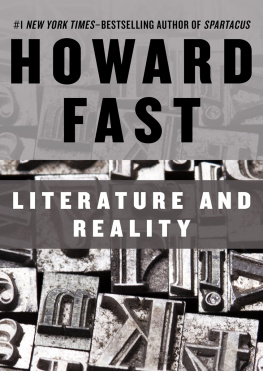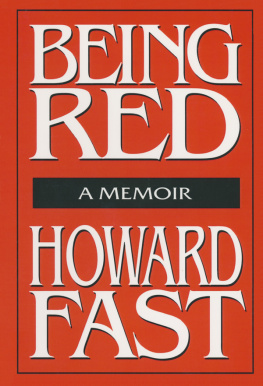War AND Peace
OBSERVATIONS ON OUR TIMES
Other Books by Howard Fast
BEING RED
THE CONFESSION OF JOE CULLEN
THE PLEDGE
THE DINNER PARTY
CITIZEN TOM PAINE (A Play)
THE IMMIGRANT'S DAUGHTER
THE OUTSIDER
MAX
TIME AND THE RIDDLE: THIRTY-ONE ZEN STORIES
THE LEGACY
THE ESTABLISHMENT
THE MAGIC DOOR
SECOND GENERATION
THE IMMIGRANTS
THE ART OF ZEN MEDITATION
A TOUCH OF INFINITY
THE HESSIAN
THE CROSSING
THE GENERAL ZAPPED AN ANGEL
THE JEWS: STORY OF A PEOPLE
THE HUNTER AND THE TRAP
TORQUEMADA
THE HILL
TWO VALLEYS
AGRIPPA'S DAUGHTER
POWER
THE EDGE OF TOMORROW
APRIL MORNING
THE GOLDEN RIVER
THE WINSTON AFFAIR
MOSES, PRINCE OF EGYPT
SYLVIA
THE LAST SUPPER
SILAS TIMBERMAN
THE PASSION OF SACCO AND VANZETTI
SPARTACUS
THE PROUD AND THE FREE
DEPARTURE
MY GLORIOUS BROTHERS
CLARKTON
THE AMERICAN
FREEDOM ROAD
CITIZEN TOM PAINE
THE UNVANQUISHED
THE LAST FRONTIER
CONCEIVED IN LIBERTY
PLACE IN THE CITY
THE CHILDREN
STRANGE YESTERDAY
War and Peace
Observations on Our Times
Howard Fast
First published 1993 by M.E. Sharpe
Published 2015 by Routledge
2 Park Square, Milton Park, Abingdon, Oxon OX14 4RN
711 Third Avenue, New York, NY 10017, USA
Routledge is an imprint of the Taylor & Francis Group, an informa business
Copyright 1993 Taylor & Francis. All rights reserved.
No part of this book may be reprinted or reproduced or utilised in any form or by any electronic, mechanical, or other means, now known or hereafter invented, including photocopying and recording, or in any information storage or retrieval system, without permission in writing from the publishers.
Notices
No responsibility is assumed by the publisher for any injury and/or damage to persons or property as a matter of products liability, negligence or otherwise, or from any use of operation of any methods, products, instructions or ideas contained in the material herein.
Practitioners and researchers must always rely on their own experience and knowledge in evaluating and using any information, methods, compounds, or experiments described herein. In using such information or methods they should be mindful of their own safety and the safety of others, including parties for whom they have a professional responsibility.
Product or corporate names may be trademarks or registered trademarks, and are used only for identification and explanation without intent to infringe.
Library of Congress Cataloging-in-Publication Data
Fast, Howard, 1914
War and peace: observations on our times / by Howard Fast.
p. cm.
ISBN 1-56324-207-9
1. United StatesSocial conditions 2. United StatesPolitics and government1989 3. Pacifism. I. Title.
HN59.2.F38 1992
306'.0973dc20
92-26859
CIP
ISBN 13: 9781563242076 (hbk)
To the memory of Barney and Ida Fast
Contents
In 1987, The New York Observer, a weekly newspaper published by Arthur Carter and edited by John Sicher, appeared in New York City. I read it occasionally, became increasingly charmed by its open approach and rejection of dogma, and finally decided that I would like to write for it. In December of 1988, I met with John Sicher, and he welcomed me onto his staff. The agreement was that I would write about any matter that interested me, and that what I wrote would be printed as I wrote it. Thus began a cordial and rather unusual relationship between writer and editor that continued for the following three years, until the end of Mr. Sicher's term as editor. During that time no column of mine was ever rejected, nor was there any instance of opposition to my way of thinking.
It was for me a remarkable opportunity to spell out some of the beliefs that were the result of a long and active life, a literary life that was also a political life, of saying what had all too long been left unsaid.
Almost half a century ago, nurtured by a poverty-stricken youth and an abiding belief in socialism as the road out of man's agony, I joined the Communist Party of the United States. Twelve years later, I saw the dreams men dreamed of the brotherhood of man dissolve in the narration of cruelty and horror that Nikita S. Khrushchev delivered to the 20th Congress of the Communist Party of the Soviet Union. As with millions of others who shared my belief in socialism and in the Soviet Union as the beginning of a socialist world, I had to come to terms with my life and my thinking. I had to learn to look at the world in a new way, and above all, I had to learn to look at all things newly, without any of the conviction of the past.
I was born in 1914, close to eighty years ago, and the background to my lifetime includes a series of horrors inflicted by human beings upon other human beings unmatched in all the history of the world. If we add to the 25 million dead of World War I, 50 million accounted dead of World War II and all the uncounted thousands of war dead in the years since, we arrive at a total of more than 100 million human beingssuch a slaughter as to numb the mind and make a true effort at empathy almost impossible. This is why I call this collection of essays by the title of War and Peace; but the murder of people by the recognized mayhem which we call war is only a part of the horror of the twentieth century. The collateral killing and suffering by starvation, murder of civilians as distinguished from the organized murder of soldiers, and death by disease make this century one that will be recalled with disgust and disbelief by future generationsthat is, assuming that we leave a viable planet to those future generations.
Historians have come by generations of glib stupidity to regard war as a measure of history, and rare is the historian who places a moral measure upon his or her narrative; and by this I do not mean the assertion or argument or gathering of proof as to right or wrong of armed struggle; I mean a deeper and different inquiry into the practice of inflicting death upon another person, whatsoever the reason. It is not the gains or losses or reasons for war that elude those who write on the subject; it is the nature of the practice.
Religion adds two facets to this strange and terrible art: the first is the promise, in both Islam and Christianity, that the dead rise up from the field of battle and take their place in that "paradise" that rewards believers with immortality; and the second is the institutionalized belief that God slavers with satisfaction at bloodshed in whatsoever they, the combatants, consider His holy cause, as witnessed in "The Battle Hymn of the Republic": "Mine eyes have seen the glory of the coming of the Lord! He is trampling out the vintage where the grapes of wrath are stored! He has loosed the fateful lightning of His terrible swift sword" and so forth and so on, ad nauseam. It is worth noting that the above hymn was the musical and liturgical accompaniment to Sherman's march to the sea in the American Civil War, a march so barbarous and savage and destructive to General Sherman's Southern countrymen that it remained unmatched for sheer horror until Adolf Hitler's invasion of the Soviet Union.
People will reject this and argue for the metaphorical signiticance of melody as simply an emotional factor, but this same emotional factor is a built-in factor of warfare. The obscene "Horst Wessel" hymn of the Nazi movement in Germany was based on a beautiful and stirring melody, and it might be useful to remember that the original words of "The Battle Hymn of the Republic" were:

